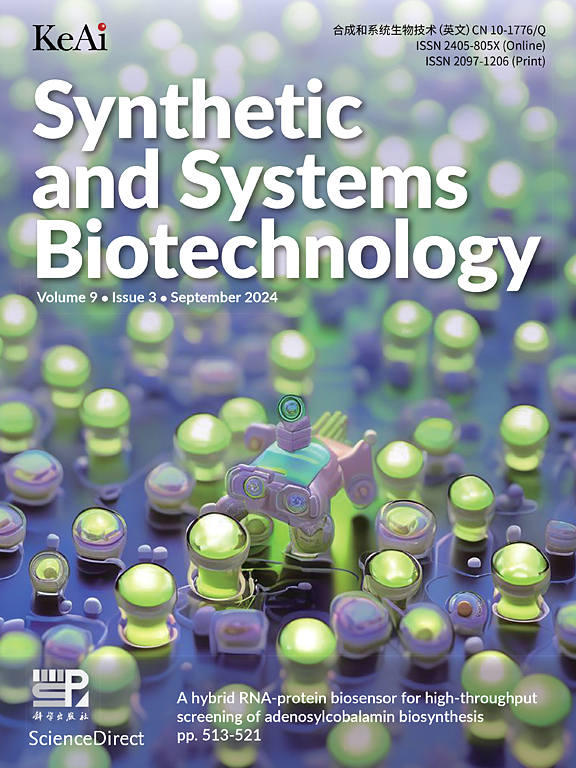Identification of two new flavone 4′-O-methyltransferases and their application in de novo biosynthesis of (2S)-hesperetin in Yarrowia lipolytica
IF 4.4
2区 生物学
Q1 BIOTECHNOLOGY & APPLIED MICROBIOLOGY
引用次数: 0
Abstract
Methyltransferases are pivotal enzymes in the biosynthesis of methylated flavonoids, including (2S)-hesperetin. However, existing flavonoid 4′-O-methyltransferase (F4′OMT) enzymes typically exhibit low substrate specificity and catalytic efficiency, which hinders microbial synthesis. To overcome this limitation, this study screened and identified two novel F4′OMTs, CrcOMT-2 and CgtOMT-3, from Chinese citrus varieties Citrus reticulata ‘Chachiensis’ (CZG) and Citrus grandis Tomentosa (HZY). These enzymes displayed high substrate specificity for (2S)-eriodictyol. A strain capable of de novo synthesis of (2S)-hesperetin was developed by integrating the novel F4′OMTs and other biosynthetic pathway genes at high copy numbers into Yarrowia lipolytica. The engineered strain achieved a remarkable production titre of (2S)-hesperetin (130.2 mg/L), surpassing the yields of previously reported F4′OMTs. Furthermore, availability of the cofactor S-adenosylmethionine (SAM) was optimised to enhance methyltransferase catalytic efficiency, enabling the engineered strain to produce 178.2 mg/L of (2S)-hesperetin during fed-batch fermentation with SAM supplementation, the highest yield reported to date. This study represents the first successful de novo biosynthesis of (2S)-hesperetin in Y. lipolytica, providing valuable insights into the synthesis of other O-methylated flavonoids.

两种新的黄酮4′- o -甲基转移酶的鉴定及其在脂性耶氏菌(Yarrowia polylitica) (2S)-橙皮素的生物合成中的应用
甲基转移酶是生物合成甲基化黄酮类化合物的关键酶,包括(2S)-橙皮苷。然而,现有的类黄酮4′- o -甲基转移酶(f4′omt)酶通常具有低底物特异性和催化效率,这阻碍了微生物的合成。为了克服这一局限,本研究从中国柑橘品种citrus reticulata ' Chachiensis (CZG)和citrus grandis Tomentosa (HZY)中筛选并鉴定了两个新的f4 ' omt, CrcOMT-2和CgtOMT-3。这些酶对(2S)-戊二醇具有高底物特异性。通过将F4'OMTs和其他高拷贝数的生物合成途径基因整合到多脂耶氏菌中,获得了一株能够重新合成(2S)-橙皮素的菌株。该工程菌株获得了显著的(2S)-橙皮素滴度(130.2 mg/L),超过了先前报道的f4 ' omt的产量。此外,优化了辅助因子s -腺苷蛋氨酸(SAM)的可用性,以提高甲基转移酶的催化效率,使工程菌株在添加SAM的补料分批发酵过程中产生178.2 mg/L (2S)-橙皮苷,这是迄今为止报道的最高产量。该研究首次成功地在脂质体Y. lipolytica中重新合成(2S)-橙皮苷,为其他o -甲基化黄酮类化合物的合成提供了有价值的见解。
本文章由计算机程序翻译,如有差异,请以英文原文为准。
求助全文
约1分钟内获得全文
求助全文
来源期刊

Synthetic and Systems Biotechnology
BIOTECHNOLOGY & APPLIED MICROBIOLOGY-
CiteScore
6.90
自引率
12.50%
发文量
90
审稿时长
67 days
期刊介绍:
Synthetic and Systems Biotechnology aims to promote the communication of original research in synthetic and systems biology, with strong emphasis on applications towards biotechnology. This journal is a quarterly peer-reviewed journal led by Editor-in-Chief Lixin Zhang. The journal publishes high-quality research; focusing on integrative approaches to enable the understanding and design of biological systems, and research to develop the application of systems and synthetic biology to natural systems. This journal will publish Articles, Short notes, Methods, Mini Reviews, Commentary and Conference reviews.
 求助内容:
求助内容: 应助结果提醒方式:
应助结果提醒方式:


